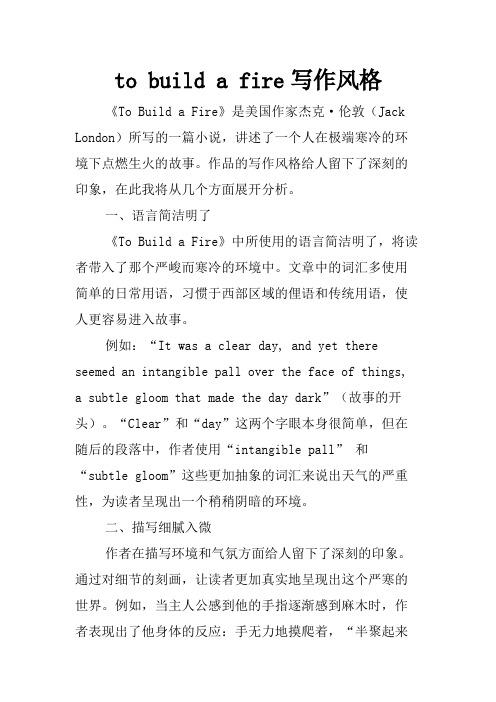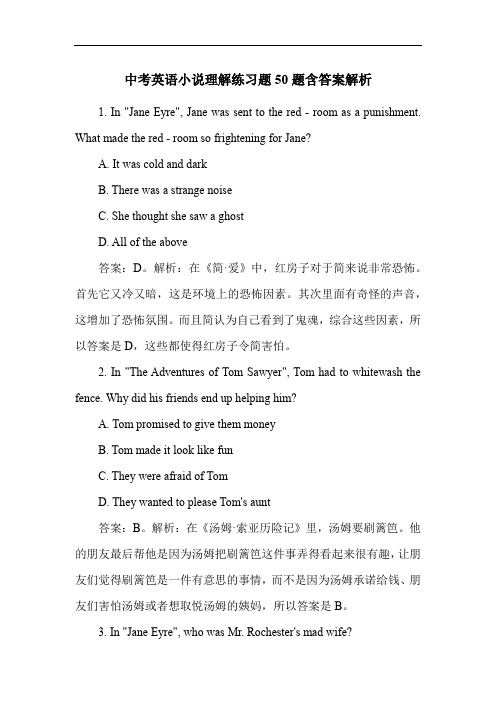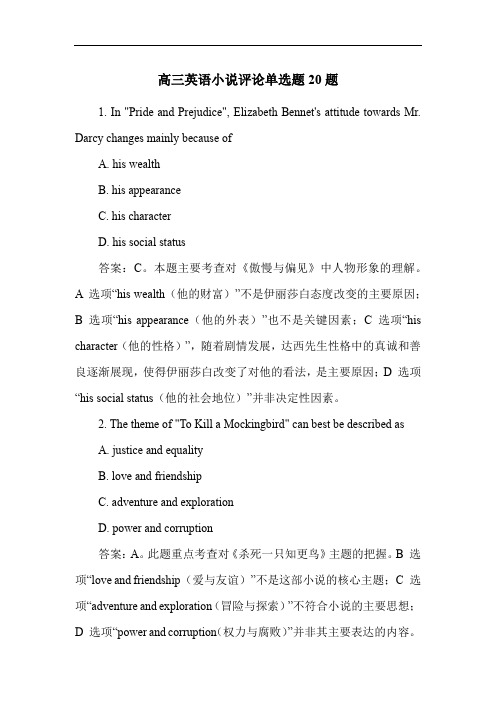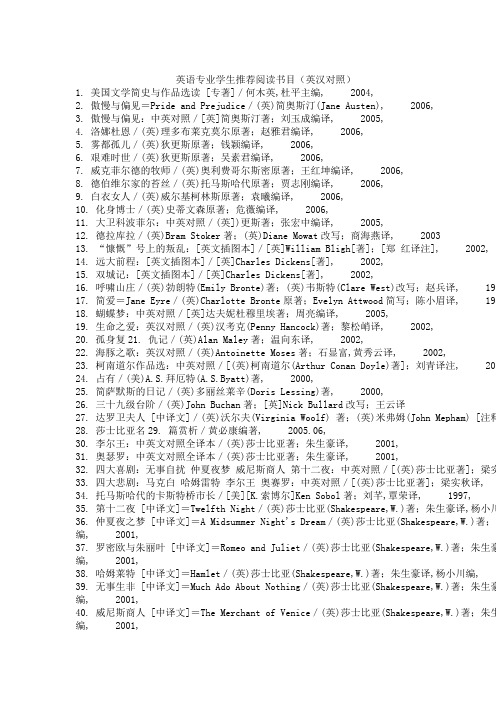英美小说要素解析 To build a fire
高三英语小说评论单选题20题(带答案)

高三英语小说评论单选题20题(带答案)1.The main theme of the novel is about love and sacrifice. Which of the following is not a possible theme?A.Friendship and loyaltyB.Revenge and hatredC.Hope and perseveranceD.Greed and ambition答案:B。
本题考查对小说主题的理解。
小说的主题是爱与牺牲,友谊和忠诚、希望和毅力、贪婪和野心在不同的小说中都可能与爱和牺牲有一定关联。
而复仇和仇恨与爱和牺牲的主题相差较大。
2.In the novel, the protagonist is brave and intelligent. What quality does the protagonist lack?A.CourageB.WisdomC.CowardiceD.Determination答案:C。
主角勇敢且聪明,勇敢对应courage,聪明对应wisdom,有决心对应determination,而cowardice 是怯懦,主角不缺乏怯懦的品质。
3.The novel portrays a complex character. Which of the following is not a characteristic of a complex character?A.One-dimensionalB.FlawedC.MultifacetedD.Realistic答案:A。
复杂的人物形象具有有缺陷(flawed)、多面性(multifaceted)、现实((realistic)等特点,而一维的((one-dimensional)不是复杂人物形象的特征。
4.The setting of the novel contributes to the theme. Which of the following settings is least likely to enhance the theme of love and sacrifice?A.A war-torn cityB.A peaceful countrysideC.A busy metropolisD.A deserted island答案:C。
《了不起的盖茨比》文学五要素分析

《了不起的盖茨比》文学五要素分析《了不起的盖茨比》是美国作家F·斯科特·菲茨杰拉德于1925年创作的长篇小说,被誉为20世纪最伟大的小说之一、这部小说以20世纪20年代美国为背景,通过描绘主人公盖茨比不屈不挠的追求和对梦想的执着追求,深刻剖析了美国社会的虚伪与空洞。
其文学价值在于对爱情、财富、虚荣等主题的深入挖掘,并通过一系列独特的文学要素来展现这些主题。
首先,小说涵盖了丰富的情节,从而增强了作品的吸引力和可读性。
故事以主人公尼克·卡拉威为叙述者,讲述了他在长岛上的邻居盖茨比的故事,引发了读者对盖茨比的好奇心。
小说中,盖茨比通过财富和奢华的生活方式来吸引梦中情人黛西,展示了他对黛西的深情和执着。
同时,小说还展现了20年代美国社会的暴露和矛盾,通过对冷漠和虚伪的描绘,揭示了社会道德和人际关系的脆弱性。
其次,小说中的人物塑造也是其文学要素之一、主人公盖茨比是一个富有的商人,他通过经商致富,但内心却一直向往着不可触摸的东西,即他的梦中情人黛西。
虽然他冒险改变了自己的身份,但在追求中却逐渐失去了自我的真实性,成为一个被虚荣驱使的人。
而黛西则是一个典型的小资产阶级女性,追求物质享受和社会地位,对待感情和责任缺乏诚意。
通过对这些角色的细腻描写和刻画,小说展现了社会背景对个人命运的影响。
此外,小说也通过描写细腻的环境来增强故事的真实感。
作品中的长岛代表着20年代美国经济繁荣和社交场所的繁忙,尤其是盖茨比的豪华别墅成为他奢靡生活的象征。
而小说中对于瓦莱特谷的描写则代表着腐败和浪费。
通过这些环境描绘,小说帮助读者更好地理解和感受到了社会和角色的特殊性。
总之,《了不起的盖茨比》通过丰富多样的情节、鲜明独特的人物塑造、细腻描绘的环境、巧妙运用的文学手法等文学要素的运用,揭示了20年代美国社会的矛盾和人性的脆弱。
这部小说不仅具有很高的艺术价值,而且深入挖掘了人类社会的本质和困境,对于读者来说具有深远的思考和启示意义。
to build a fire写作风格

to build a fire写作风格《To Build a Fire》是美国作家杰克·伦敦(Jack London)所写的一篇小说,讲述了一个人在极端寒冷的环境下点燃生火的故事。
作品的写作风格给人留下了深刻的印象,在此我将从几个方面展开分析。
一、语言简洁明了《To Build a Fire》中所使用的语言简洁明了,将读者带入了那个严峻而寒冷的环境中。
文章中的词汇多使用简单的日常用语,习惯于西部区域的俚语和传统用语,使人更容易进入故事。
例如:“It was a clear day, and yet there seemed an intangible pall over the face of things, a subtle gloom that made the day dark”(故事的开头)。
“Clear”和“day”这两个字眼本身很简单,但在随后的段落中,作者使用“intangible pall” 和“subtle gloom”这些更加抽象的词汇来说出天气的严重性,为读者呈现出一个稍稍阴暗的环境。
二、描写细腻入微作者在描写环境和气氛方面给人留下了深刻的印象。
通过对细节的刻画,让读者更加真实地呈现出这个严寒的世界。
例如,当主人公感到他的手指逐渐感到麻木时,作者表现出了他身体的反应:手无力地摸爬着,“半聚起来的手指末端成了销子似的。
”这样的描写让读者能够感同身受,产生共鸣。
同时,在细节描写的方面,作者让读者感到主人公简直就是冷的肉体反应的各个方面的奴隶。
“It travelled on its own volition now”,就是人对于自己的控制力度越来越不好时的反应,主人公直接被寒冷所支配。
三、渲染独特的西部风情《To Build a Fire》作者杰克·伦敦擅长于创作有西部风情和文化色彩的小说。
小说中,作者利用呆板和平淡的语言,成功地创造了一个生动逼真的简陋的环境,而且以此作为展现主人公与自然斗争的一个有效手段。
中考英语小说理解练习题50题含答案解析

中考英语小说理解练习题50题含答案解析1. In "Jane Eyre", Jane was sent to the red - room as a punishment. What made the red - room so frightening for Jane?A. It was cold and darkB. There was a strange noiseC. She thought she saw a ghostD. All of the above答案:D。
解析:在《简·爱》中,红房子对于简来说非常恐怖。
首先它又冷又暗,这是环境上的恐怖因素。
其次里面有奇怪的声音,这增加了恐怖氛围。
而且简认为自己看到了鬼魂,综合这些因素,所以答案是D,这些都使得红房子令简害怕。
2. In "The Adventures of Tom Sawyer", Tom had to whitewash the fence. Why did his friends end up helping him?A. Tom promised to give them moneyB. Tom made it look like funC. They were afraid of TomD. They wanted to please Tom's aunt答案:B。
解析:在《《汤姆·索亚历险记》里,汤姆要刷篱笆。
他的朋友最后帮他是因为汤姆把刷篱笆这件事弄得看起来很有趣,让朋友们觉得刷篱笆是一件有意思的事情,而不是因为汤姆承诺给钱、朋友们害怕汤姆或者想取悦汤姆的姨妈,所以答案是B。
3. In "Jane Eyre", who was Mr. Rochester's mad wife?A. Blanche IngramB. Bertha MasonC. Mrs. FairfaxD. Adele Varens答案:B。
高三英语小说评论单选题20题

高三英语小说评论单选题20题1. In "Pride and Prejudice", Elizabeth Bennet's attitude towards Mr. Darcy changes mainly because ofA. his wealthB. his appearanceC. his characterD. his social status答案:C。
本题主要考查对《傲慢与偏见》中人物形象的理解。
A 选项“his wealth(他的财富)”不是伊丽莎白态度改变的主要原因;B 选项“his appearance(他的外表)”也不是关键因素;C 选项“his character((他的性格)”,随着剧情发展,达西先生性格中的真诚和善良逐渐展现,使得伊丽莎白改变了对他的看法,是主要原因;D 选项“his social status(他的社会地位)”并非决定性因素。
2. The theme of "To Kill a Mockingbird" can best be described asA. justice and equalityB. love and friendshipC. adventure and explorationD. power and corruption答案:A。
此题重点考查对(《杀死一只知更鸟》主题的把握。
B 选项“love and friendship(爱与友谊)”不是这部小说的核心主题;C 选项“adventure and exploration((冒险与探索)”不符合小说的主要思想;D 选项“power and corruption((权力与腐败)”并非其主要表达的内容。
A 选项“justice and equality((正义与平等)”贯穿了整个故事,是其最恰当的主题描述。
3. In "Jane Eyre", Mr. Rochester is characterized asA. cruel and selfishB. gentle and kindC. mysterious and complexD. simple and straightforward答案:C。
小说的要素英文ppt分析解析

Round characters are more complex than flat or stock characters, and often display the inconsistencies and internal conflicts found in most real people. They are more fully developed, and therefore are harder to summarize. Journey to the West
The Elements of Fiction
Fiction refers to any imaginary work portraying characters and events
Elements of fiction
Classification of fiction : novel, novelette, short story. Short short story.
Setting
The setting is the physical and social context in which the action of a story occurs. The major elements of setting are the time, the place, and the social environment that frames the characters. Setting can be used to evoke a mood or atmosphere that will prepare the reader for what is to come. Sometimes, writers choose a particular setting because of traditional associations with that setting that are closely related to the action of a story.
To Build a Fire Summary

《生火》是著名美国作家,捷克伦敦的著名短篇故事之一。
描写的是一个人独自在寒冷中行走,最终抵御不住严寒而冻死的故事。
《生火》是一篇经典的自然主义作品。
故事中的人藐视自然,却被自然挫败。
叙述在大雪纷飞的寒冬之际,一只狗跟着一位旅人,徒步横越阿拉斯加。
故事主要是想告诉读者这位旅人之所以能让狗乖乖地跟在他身边,完全是因为他身上有可以用来生火的火柴,可以提供这只狗在冰天雪地所需要的温暖,并不是因为狗对主人的忠心。
半个月后的一个雪夜里,这只狗悄悄的离开了这位旅人,原因是旅人不小心将身上的火柴弄湿,不能再像之前一样生火,让它度过漫漫长夜。
杰克伦敦在故事的最后写道:“这只狗在严冬的夜空下低吠,还是未见主人有生火的动静,他觉的眼前的这位主人,似乎已是无法再满足它所要的温暖,只好夹着尾巴,低着头离开,在月光下继续寻找另一个可能给予它温暖火光的主人。
” 英文版简介To Build A Fire and Other Storiesis the most comprehensive and wide-ranging collectionof Jack London's short stories 口口ailable in paperback. This superb volume brings togethertwenty-five of London's finest, including a dozen of his great Klondike stories, vivid tales of theFar North were rugged individuals, such as the Malemute Kid face the violence of man and natureduring the Gold Rush Days. Also included are short masterpieces from his later writing, plussix stories un口口ailable in any other paperback edition. Here, along with London's famous wildernessadventures and fireband desperadoes, are portraits of the working man, the immigrant, and the exoticoutcast: characters representing the entire span of the author's prolific imaginative career, in tales thath口口e been acclaimed throughout the world as some of the most thrilling short stories ever written.There is a man in Alaska who wanted a camp near Henderson Creek.And,his friends have already been thereTo Build a Fire SummaryA man travels in the Yukon (in Alaska) on an extremely cold morning with a husky wolf-dog. The cold does not faze the man, a newcomer to the Yukon, who plans to meet his friends by six o'clock at an old claim. As it grows colder, he realizes his unprotected cheekbones will freeze, but he does not pay it much attention. He walks along a creek trail, mindful of the dangerous, concealed springs; even getting wet feet on such a cold day is extremely dangerous. He stops for lunch and builds a fire.The man continues on and, in a seemingly safe spot, falls through the snow and wets himself up to his shins. He curses his luck; starting a fire and drying hisfoot-gear will delay him at least an hour. His feet and fingers are numb, but he starts the fire. He remembers the old-timer from Sulphur Creek who had warned him that no man should travel in the Klondike alone when the temperature was fifty degrees below zero.The man unties his icy moccasins, but before he can cut the frozen strings on them, clumps of snow from the spruce tree above fall down and snuff out the fire. Though building a fire in the open would have been wiser, it had been easier for the man to take twigs from the spruce tree and drop them directly below on to the fire. Each time he pulled a twig, he had slightly agitated the tree until, at this point, a bough high up had capsized its load of snow. It capsized lower boughs in turn until a small avalanche had blotted out the fire.The man is scared, and sets himself to building a new fire, aware that he is already going to lose a few toes from frostbite. He gathers twigs and grasses. His fingers numb and nearly lifeless, he unsuccessfully attempts to light a match. He grabs all his matches--seventy--and lights them simultaneously, then sets fire to a piece ofbark. He starts the fire, but in trying to protect it from pieces of moss, it soon goes out.The man decides to kill the dog and puts his hands inside its warm body to restore his circulation. He calls out to the dog, but something fearful and strange in his voice frightens the dog. The dog finally comes forward and the man grabs it in his arms. But he cannot kill the dog, since he is unable to pull out his knife or even throttle the animal. He lets it go.The man realizes that frostbite is now a less worrisome prospect than death. He panics and runs along the creek trail, trying to restore circulation, the dog at his heels. But his endurance gives out, and finally he falls and cannot rise. He fights against the thought of his body freezing, but it is too powerful a vision, and he runs again. He falls again, and makes one last panicked run and falls once more. He decides he should meet death in a more dignified manner. He imagines his friends finding his body tomorrow.The man falls off into a comfortable sleep. The dog does not understand why the man is sitting in the snow like that without making a fire. As the night comes, it comes closer and detects death in the man's scent. It runs away in the direction of the camp, "where were the other food-providers and fire-providers."。
大学英语专业推荐阅读书目

英语专业学生推荐阅读书目(英汉对照)1. 美国文学简史与作品选读 [专著]/何木英,杜平主编, 2004,2. 傲慢与偏见=Pride and Prejudice/(英)简奥斯汀(Jane Austen), 2006,3. 傲慢与偏见:中英对照/[英]简奥斯汀著;刘玉成编译, 2005,4. 洛娜杜恩/(英)理多布莱克莫尔原著;赵雅君编译, 2006,5. 雾都孤儿/(英)狄更斯原著;钱颖编译, 2006,6. 艰难时世/(英)狄更斯原著;吴素君编译, 2006,7. 威克菲尔德的牧师/(英)奥利费哥尔斯密原著;王红坤编译, 2006,8. 德伯维尔家的苔丝/(英)托马斯哈代原著;贾志刚编译, 2006,9. 白衣女人/(英)威尔基柯林斯原著;袁曦编译, 2006,10. 化身博士/(英)史蒂文森原著;危薇编译, 2006,11. 大卫科波菲尔:中英对照/(英])更斯著;张宏中编译, 2005,12. 德拉库拉/(英)Bram Stoker著;(英)Diane Mowat改写;商海燕译, 200313. “慷慨”号上的叛乱:[英文插图本]/[英]William Bligh[著];[郑红译注], 2002,14. 远大前程:[英文插图本]/[英]Charles Dickens[著], 2002,15. 双城记:[英文插图本]/[英]Charles Dickens[著], 2002,16. 呼啸山庄/(英)勃朗特(Emily Bronte)著;(英)韦斯特(Clare West)改写;赵兵译, 199717. 简爱=Jane Eyre/(英)Charlotte Bronte原著;Evelyn Attwood简写;陈小眉译, 1981,18. 蝴蝶梦:中英对照/[英]达夫妮杜穆里埃著;周亮编译, 2005,19. 生命之爱:英汉对照/(英)汉考克(Penny Hancock)著;黎松峭译, 2002,20. 孤身复21. 仇记/(英)Alan Maley著;温向东译, 2002,22. 海豚之歌:英汉对照/(英)Antoinette Moses著;石显富,黄秀云译, 2002,23. 柯南道尔作品选:中英对照/[(英)柯南道尔(Arthur Conan Doyle)著];刘青译注, 2001,24. 占有/(美)A.S.拜厄特(A.S.Byatt)著, 2000,25. 简萨默斯的日记/(英)多丽丝莱辛(Doris Lessing)著, 2000,26. 三十九级台阶/(英)John Buchan著;[英]Nick Bullard改写;王云译27. 达罗卫夫人 [中译文]/(英)沃尔夫(Virginia Woolf) 著;(英)米弗姆(John Mepham) [注释28. 莎士比亚名29. 篇赏析/黄必康编著, 2005.06,30. 李尔王:中英文对照全译本/(英)莎士比亚著;朱生豪译, 2001,31. 奥瑟罗:中英文对照全译本/(英)莎士比亚著;朱生豪译, 2001,32. 四大喜剧:无事自扰仲夏夜梦威尼斯商人第十二夜:中英对照/[(英)莎士比亚著];梁实33. 四大悲剧:马克白哈姆雷特李尔王奥赛罗:中英对照/[(英)莎士比亚著];梁实秋译,34. 托马斯哈代的卡斯特桥市长/[美][K.索博尔]Ken Sobol著;刘芊,覃荣译, 1997,35. 第十二夜 [中译文]=Twelfth Night/(英)莎士比亚(Shakespeare,W.)著;朱生豪译,杨小川36. 仲夏夜之梦 [中译文]=A Midsummer Night's Dream/(英)莎士比亚(Shakespeare,W.)著;朱生37. 罗密欧与朱丽叶 [中译文]=Romeo and Juliet/(英)莎士比亚(Shakespeare,W.)著;朱生豪38. 哈姆莱特 [中译文]=Hamlet/(英)莎士比亚(Shakespeare,W.)著;朱生豪译,杨小川编, 239. 无事生非 [中译文]=Much Ado About Nothing/(英)莎士比亚(Shakespeare,W.)著;朱生豪40. 威尼斯商人 [中译文]=The Merchant of Venice/(英)莎士比亚(Shakespeare,W.)著;朱生41. 麦克白 [中译文]=Macbeth/(英)莎士比亚(Shakespeare,W.)著;朱生豪看不42. 见的人 [夫埃里森(Ralph Ellison)著, 2000,43. 简萨默斯的日记/(英)多丽丝莱辛(Doris Lessing)著译,杨小川编, 2001,44. 爱丽思漫游奇境记:中英对照/[英]卡罗尔(Lewis Carroll)著;李敏中译, 2004,45. 北回归线 [中译文]=TROPIC OF CANCER/(美)亨利米勒(Henry Miller) 著;亦霖注释,46. 查尔斯狄更斯的艰难时世/[美][P.M.奥乔杰斯基]Paul M.Ochojski著;姜红译, 1997,47. 亨利詹姆斯的贵妇画像/[美][V.基诺安]Vartkis Kinoian著;章汝雯译, 1997,48. 托马斯哈代的还乡/[美][C.L.莱维特]Charles L.Leavitt,[美][E.S.莱维特]Emily S.Leavi 2. Other English Works49. 最经典的短篇小说:汉英珍藏版/徐翰林编译, 2006.11,50. 英语散文精品赏析/程梅编著, 2005,51. 英美小说要素解析/林六辰编著, 2004.07,52. 巴黎圣母院:英汉对照/(法)雨果(V.Hugo)著;王怀远译注, 1986,53. 英语现代散文选/李汝仪,章祖德选注, 1983,54. 英文名55. 篇鉴赏金库散文卷/辜正坤主编, 2006,56. 英文名57. 篇鉴赏金库电影卷/钱锋, 刘爱萍58. 编著, 2005,59. 英美文学赏析教程散文与诗歌/罗选民主编, 2002,60. 英文名61. 篇鉴赏金库诗歌卷/辜正坤主编, 2000,62. 英文名63. 篇鉴赏金库小说卷/王占梅,蔡丽文编著, 2000,64. 世界上最美的诗歌:全新中英对照版/(英)托马斯哈代(Thomas Hardy)等著;成应翠编著, /Richard A. Lanham, 2004,65. 经典英语短篇小说赏析= Classic short stories in English/王玲主编, 2005,66. 彼得潘:[英文插图本]/[英]J. M. Barrie[著], 2002, H319.4:I/B11467. 丛林历险记:[英文插图本]/[英]Rudyard Kipling[著], 2002,68. 世界上最美的诗歌:全新中英对照版/(英)托马斯哈代(Thomas Hardy)等著;成应翠编著,69. 浪漫短诗/朱孝愚, 张爱民编译, 2006,70. 英文经典歌词赏析/袁晓波, 倪志磊, 谢宜兴编著, 2005,71. 英语爱情诗歌精粹/程雪猛等编译, 2000,72. 二十世纪西方文论选读:[英语读物]/张中载,王逢振,赵国新编, 2002,73. 时尚英语主题阅读精美散文篇/翁云凯主编, 200774. 现代美文阅读:[英汉对照]/冯其良,董西华编著, 2006,75. 最伟大的演说辞:汉英珍藏版/徐翰林编译, 2006,76. 西方经典演讲辞:英汉对照本/《西方元典》编委会主编;吴群芳编译, 2005.08,77. 世界上最美丽的英文:爱与人生= Love and Life/赵妍编, 200578. 西方经典情书:英汉对照本=Western classical love letters/《西方元典》编委会主编;79. 人类最伟大的声音= The greatest speeches in the world:全新中英对照版/(美) 亚伯拉希80. 腊罗马神话与西方民间传说:英汉对照=Classical Mythology & Western Legends/郝澎编81. 杜甫诗选:汉英对照/[(唐)杜甫著];(新西兰)路易艾黎(Rewi Alley)英译, 2003,82. 阿Q正传:[汉英对照]/鲁迅著;杨宪益,戴乃迭译, 2003,83. 中国现代名84. 家短篇小说选:汉英对照/老舍85. 等著;沙博理等英译, 2002,86. 彷徨:[汉英对照]/鲁迅著;杨宪益,戴乃迭译, 2002,87. 鲁迅诗选:[汉英对照]/鲁迅著;(英)W.J.F.詹纳尔(W.J.F.Jenner)译, 2002,88. 嬉雪:中国当代女性散文选:汉英对照本/朱虹,周欣编, 2002,89. 日出:汉英对照/曹禺著;(英)巴恩斯(Barnes)译, 2001,90. 雷雨:[汉英对照]/曹禺著;王佑良,巴恩斯译, 2001,91. Tales of Prime Ministers in Ancient China/程宇编译, 2001,92. 关汉卿杂剧选二:汉英对照/[(元)关汉卿著];杨宪益,戴乃迭译, 2001,93. 关汉卿杂剧选一:汉英对照/[(元)关汉卿著];杨宪益,戴乃迭译, 2001,94. 长生殿:汉英对照/(清)洪昇95. 著;杨宪益,戴乃迭译, 2001,96. 茶馆:[汉英对照]/老舍97. 著;霍98. 华译, 2001,99. 骆驼祥子:汉英对照/老舍100. 著;施晓菁译, 2001,101. 太平广记选:汉英对照/(宋)李〓等编;张光前译, 2001,102. 聊斋志异选:汉英对照/(清)蒲松龄著;(美)丹尼斯马尔(Denis C.Mair),(美)维克多马尔(Vi 103. 汉魏六朝小说选:汉英对照读物/杨宪益,戴乃迭译, 2001,104. Six Classical Chinese Comedies/[钟元编], 2001,105. 鲁迅小说选:[汉英对照]/鲁迅著;杨宪益,戴乃迭译, 2000,106. 倘若鸟儿回还:百味人生美文精选:英汉对照/明廷雄译注, 2001,107. 东坡诗文选:[中英对照]/[(宋)苏东坡著];林语堂译, 2002,108. 爱的教育:中英对照/(意)亚米契斯著;徐立编译, 2005,109. 宋词:[汉英对照]/聂鑫森今译;杨宪益,戴乃迭等英译, 2001,110. 诗经:汉英对照/野莽今译;杨宪益,戴乃迭等英译, 2001,111. 女神:汉英对照/郭沫若著;( )勒斯特(Jong Lester),( )巴恩斯(A.C.Barnes)译, 2001 112. 英语电影对白:英汉对照, 2003,113. 汉英对照《千家诗》/郭著章,傅惠生等编译, 2004,114. 安徒生童话精粹:英汉对照/(丹)安徒生(Hans Christian Andersen)原著;( )W.A.Craigi 欣中译, 2003,大学生读书目录推荐1.《语言问题》赵元任著,商务印书馆,1980年版2.《语言与文化》罗常培著,语文出版社,1989年版3.《汉语语法分析问题》吕叔湘著,商务印书馆,1979年版4.《修辞学发凡》陈望道著,上海教育出版社,1979年版5.《汉语方言概要》袁家骅等著,文字改革出版社,1983年版6.《马氏文通》马建忠著,商务印书馆,1983年版9.《中国语言学史》王力著,山西人民出版社,1981年版12.《普通语言学教程》(瑞士)索绪尔著,高名凯译,岑麒祥、叶蜚声校注,商务印书馆,19814.《西方语言学名著选读》胡明扬主编,中国人民大学出版社,1988年版15.《应用语言学》刘涌泉、乔毅编者,上海外语教育出版社,1991年版20.《文心雕龙选译》刘勰著,周振甫译注,中华书局1980年版22.《西方文艺理论史精读文献》章安祺编,中国人民大学出版社1996年版23.《20世纪西方美学名著选》蒋孔阳主编,复旦大学出版社1987年版24.《西方美学史》朱光潜著,人民文学出版社1979年版25.《文学理论》(美)韦勒克、沃伦著,刘象愚等译,三联书店1984年版26.《比较文学与文学理论》(美)韦斯坦因著,刘象愚译,辽宁人民出版社1987年版35.《李白诗选》复旦大学中文系古典文学教研组选注,人民文学出版社1977年版36.《杜甫诗选》萧涤非选注,人民文学出版社1985年版41.《唐宋词选》中国社科院文学所编,人民文学出版社1982年版46.《西厢记》王实甫著,王季思校注,人民文学出版1978年版47.《三国演义》罗贯中著,人民文学出版社1957年版48.《水浒传》施耐庵著,人民文学出版社1975年版49.《西游记》吴承恩著,人民文学出版社1955年版51.《牡丹亭》汤显祖著,人民文学出版社1982年版52.《聊斋志异选》张友鹤选注,人民文学出版社1978年版53.《儒林外史》吴敬梓著,人民文学出版社1977年版54.《红楼梦》曹雪芹著,人民文学出版社1982年版57.《老残游记》刘鹗著,人民文学出版社1959年版58.《鲁迅小说集》人民文学出版社1979年版60.《女神》郭沫若著,人民文学出版社1978年重印版61.《郁达夫小说集》浙江人民出版社1982年版63.《子夜》茅盾著,人民文学出版社1994年版64.《家》巴金著,人民文学出版社1979年版65.《沈从文小说选集》,人民文学出版社1982年版66.《骆驼祥子》老舍著,人民文学出版社1999年版67.《曹禺选集》曹禺著,人民文学出版社1978年版69.《围城》钱钟书著,人民文学出版社1980年版73.《茶馆》老舍著,收《<茶馆><龙须沟>》,人民文学出版社1994年版78.《中国当代文学作品选》王庆生主编,华中师范大学出版社1997年版79.《希腊的神话和传说》(德)斯威布著,楚图南译,人民文学出版社197782.《哈姆莱特》(《莎士比亚悲剧四》)卞之琳译,人民出版社1988年版83.《伪君子》(法)莫里哀著,李健吾译,上海译文出版社1980年版84.《浮士德》(德)歌德著,董问樵译,复旦大学出版社1982年版85.《悲惨世界》(法)雨果著,李丹、方于译,人民文学出版社1978-1983年版86.《红与黑》(法)司汤达著,郝运译,上海译文出版社1986年版87.《高老头》(法)巴尔扎克著,傅雷译,人民文学出版社1954年版88.《双城记》(英)狄更斯著,石永礼译,人民文学出版社1993年版89.《德伯家的苔丝》(英)哈代著,张谷若译,人民文学出版社1957年版91.《安娜·卡列尼娜》(俄)托尔斯泰著,周扬、谢索台译,人民文学出版社1978年版92.《母亲》(俄)高尔基著,瞿秋白等译,人民文学出版社1980年版93.《百年孤独》(哥伦比亚)加西亚·马尔克斯著,黄锦炎等译,上海译文出版社,1984年版97.《泰戈尔诗选》(印)冰心译,湖南人民出版社1981年版99.《一千零一夜》(阿拉伯)纳训译,人民文学出版社1957年版100.《外国文学作品选》(两卷本)郑克鲁编,复旦大学出版“英美文学”必读作品“英美文学”为外语系英语专业三年级学生在第五、六学期所开设的专业课。
- 1、下载文档前请自行甄别文档内容的完整性,平台不提供额外的编辑、内容补充、找答案等附加服务。
- 2、"仅部分预览"的文档,不可在线预览部分如存在完整性等问题,可反馈申请退款(可完整预览的文档不适用该条件!)。
- 3、如文档侵犯您的权益,请联系客服反馈,我们会尽快为您处理(人工客服工作时间:9:00-18:30)。
Does the story have a theme? If it does, describe it. To build a fire symbolizes an onion; the external theme he illustrates is the man’s struggle to meet up with his friends, i.e. human
How does London's prose style(particularly his use of imagery) serve to eatablish and then to intensify that mood? London ’s Writting Style
Social Darwinism: the survival of the fittest Naturalism mingled with Romanticism Forceful and colorful Subjectivity and enthusiasm His characterizations were often stiff and his dialogue stereotyped.
dominant mood of the story : isolation helplessness depression melancholy
Evidence and Data 1. A man is climbing the high earth-
bank in Yukon alone, and the man has no experience of climbing in 75. ---- These two sentences show the mood of isolation and helplessness. 2. “day had broken cold and gray, exceedingly cold and grey”. ---This sentence hints at the depressing atmosphere. 3.He is shocked when the fire
First style---The author from two
aspects tell us the theory of Naturalism: natural selection and survival of the fittest .
On the one hand, between different species, the story shows the competition of human beings and dog. In the extreme cold environment, if one can't adapt to the harsh natural environment, there is only one outcome - turned out to be the victim of the nature. In the story, the man failled to fight against the nature, and in the end, he is dead. On the contrary, the dog
What comment does the story make about the relationship between man and nature?
presented by 黄
Fory of the survival of the fittest is one of important comments. we human beings are very powerful, but compared with the nature, we are fragile and obscure. If we want to have a stand in this nat ure, we should learn how to show our reverence toward the natur
operates as a third person and an outside odserver; he tells the story in an objective way as he knows everything and it is on concern for the man.
Second style----The author
1.What is the dominant mood of the story? How does London’s prose style (particularly his use of imagery ) serve to establish and to intensify that mood?
In addition, based on t
he story, the author als o puts forward the nec essity and inevitability of keeping a harmonio us relationship betwee n the man and the natu
We can draw a conclusion that : the theme of this story is: The fittest survive.
you!
Thank
Group 6
What is the dominant mood of the story? How does London's prose style(particularly his use of imagery) serve to eatablish and then to intensify that mood?
should respect nature and revere the power of nature
Further more, once you peel the outer layers off, you realize that he intertwines the deeper meaning of ignorance, the
survival, and knowledge.
The man’s instincts and sense allow him to understand the weather is definite drawback, but ignorance and the stubbornness triumphs. He goes into this adventure without knowledge of the dangers that can be occurred, he did not realize What he was
In this story, we can see that London establish and intensify the mood of isolation, helplessnee, depression and melancholy through two kind of prose style. First, Social Darwinism( the survival of the fittest) Second, Third-person
